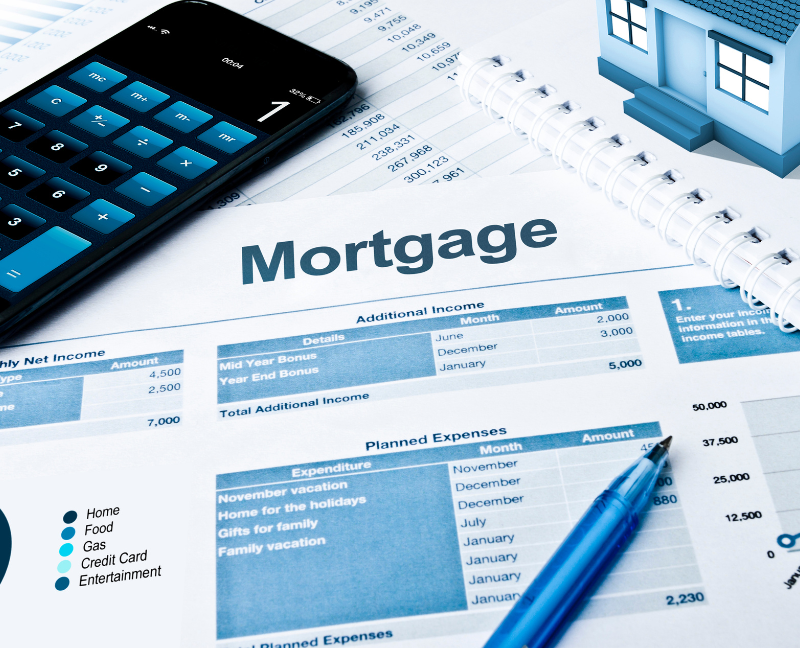As summer draws to a close, the country's housing market, which has recently favored sellers, shifts into a "neutral" state as October approaches, placing buyers and sellers on an even playing field. Orphe Divounguy, Senior Economist at Zillow®, says that a more balanced market would probably have fewer buyers. If you want to sell in the fall, you might wonder what constitutes a "neutral market."
According to him, the type of market highlights how crucial it is to determine the ideal list price because, in contrast to other listings, those that are priced competitively and effectively advertised get under contract in an average of just eighteen days.
Setting a price for a property that will sell strategically is never simple, but it can be particularly difficult in the fall when buyers with financial difficulties still struggle with affordability. In July, over 25% of sellers nationwide (i.e., the greatest percentage in the last five years) lowered their prices for the spring-summer selling season.
Divounguy claims that sellers "haven't gotten the memo quite yet." He also said that: "They're still listing their homes too high. That's why you're seeing more price cuts on these homes. And the homes that are mispriced are staying on the market longer."
In addition to learning how much to charge for a home, sellers and prospective buyers have a lot to consider this autumn, from the very variable local market circumstances to concerns about the direction of mortgage rates. Here are our predictions for the fall selling season of 2024:
Fall is typically the slowest season for house sales, partly because parents with young children tend to put off house hunting after the school year begins. According to Zillow data, consumers withdrew from house hunting earlier this year than usual. This decreased competition across the country and forced sellers to lower their asking prices and make concessions to draw in buyers.
The retreat affects inventories, which rose in July in all but five of the major metro areas that Zillow economists examined. It's also having an impact on property values, which just marginally increased in July, per a recent Zillow research.
According to Zillow's projection, home values will rise by 1% nationally over the next 12 months, which is a significant deceleration from previous years, according to Divounguy.
"While price growth could continue to ease somewhat, I don't expect big price declines," Divounguy says. "TWe’ll need to see a big increase in inventory to see a large decline in home values. Recent small improvements in affordability could bring back more buyers than sellers, which could slow the increase in housing inventory, and prevent the market from cooling further."
The number of available homes in the US will drop by 4.5 million in 2022, per Zillow research. Apart from their scarcity, the annual production of new residences has not kept pace with the rate of construction. Even while buyers find it difficult to pay, sellers should expect steady home values for the foreseeable future as a result of the shortage.

It is generally anticipated that the Federal Reserve Board will lower its main policy rate in September and maybe later. The Fed's projections may already be reflected in current mortgage rates, though.
He believes that long-term economic variables like inflation and the state of the economy as a whole are often taken into account by lenders when setting interest rates. Therefore, even while the expectation of Fed rate cuts may be influencing mortgage rates at the moment, additional declines in mortgage rates are unlikely if economic growth continues to be robust.
Despite a decline from the 2.8% seasonally adjusted rate seen in the second quarter, the US economy's third-quarter seasonally adjusted annual growth rate is 2%.
Although it has somewhat improved, most prospective purchasers still face significant barriers due to housing affordability. Home prices may rise as more purchasers try to take advantage of the recent rate reduction.
Additionally, since interest rates aren't going to continue dropping, buyers will probably continue to feel pressured by the combination of high house prices, higher-than-usual interest rates, and the necessity of saving money for a down payment.
Because of the budget issue, consumers are searching for the greatest offers.
Well-priced and well-marketed properties continue to sell quickly, even if the majority of listings decline. Properties that sold in July took just 18 days to go pending, which is six days less than a year ago but still quicker than before the outbreak.
Zillow data also indicates that greater sale premiums are associated with contemporary characteristics that distinguish a home as either brand new or recently updated. Small upgrades that give your house a "new construction" appearance, marketing resources like virtual floor plans and 3D home tours on your listing, and well-thought-out pricing may make a big impact.
The local situation is contradictory, even though the national market is no longer a seller's market. Certain markets still favor sellers, while others favor buyers.
Discuss the plan of action based on the state of the local market with a real estate agent.
An experienced real estate agent in your area may assess your house to see what it might bring in light of the neighborhood's characteristics and the prices at which previously sold comparable properties in the area.
Take note of the cost.
As mentioned above, well-priced and well-maintained homes still sell rapidly, but if there aren't many sales in your region to compare prices to, it may be difficult to determine the proper price.
Think about making accommodations.
If sellers make accommodations that enable purchasers to reduce their monthly mortgage payments, they could do so faster. According to the National Association of Home Builders, 61% of builders make compromises to succeed in this market without having to lower costs.
“If builders are offering incentives to buyers, then sellers should probably do the same to keep well-priced homes moving,’’ advises Divounguy.
What are your thoughts? Feel free to share them in the comments!
Interest rates were roughly 3.5% in 2013; however, during the COVID-19 pandemic, they fell as low as 2%. Since purchasers no longer had to include a sizable amount of interest in their monthly payments, this greatly reduced the cost of homes. Interest rates have remained relatively low in 2024, averaging 6.5% compared to 2024 levels of about 8%. Thankfully, buyers who are worried about loan rates or just want to acquire good offers have options. This means it might be possible to benefit from a seller's favorable interest rates by accepting an assumable mortgage.
The thing is that mortgages that are assumed can be trickier than they appear. Accepting one of these loans has advantages, no doubt, but there are cons as well. Therefore when looking for a home, it’s best to understand how to find the right assumable mortgage first.
Basically, a seller who transfers a mortgage to a buyer is considered an assumable mortgage. This means that the monthly payments, interest rate, remaining principal, and other terms and conditions are assumed by the buyer. The payment on the mortgage comes after closing of the property.
When a buyer accepts an assumable mortgage, they are not required to apply for loans through the conventional procedure of loan shopping. Even though taking on an assumable loan still requires review and underwriting, the buyer cannot switch lenders or leave the property while the mortgage terms are still in place. The buyer, house, financing, and lender were all connected as a single entity.
Assumable loans gained popularity when the interest rates were still high. Buyers search for loan suppliers offering exceptional loan conditions that they can't find elsewhere. Assumable mortgages are something that sellers can advertise to purchasers and their real estate agents to make their homes more appealing.
The assumable loan may make the house appear more affordable to buyers, therefore raising the property's perceived worth.
Purchasers can take over sellers' mortgages with many lenders. It may still be possible for you to take on those mortgages if you have a VA loan or are considering a home with an FHA loan. These are some resources that you can utilize.
USDA Loans: For eligible buyers, loans from the United States Department of Agriculture (USDA) may also be taken out. USDA loans are designed to help people buy houses in rural areas.
Finding assumable mortgages is frequently not the most challenging part; finding sellers who are aware that their debt can be assumed is. Sellers should thoroughly understand how it works and market any alternatives they may have for debt assumption alongside the rest of their property.
It's not a good idea to take on an assumable loan just because you can. Before accepting the loan balance, it is crucial to assess your financial situation and the macro trends. Here are some factors to think about while assessing whether or not to adopt a mortgage payment.
Taking out a mortgage isn't always the best option. Although many customers find this to be a good alternative, it might not work best for your current situation. With the chance to refinance at a reduced interest rate later on, you might be better off paying a conventional mortgage payment in the short run.
You can begin your search for an assumable mortgage once you have a firm understanding of them and determine that they are the best option for you. You may get in touch with sellers regarding these mortgage loans in a few different ways.
Be aware that assumable mortgage listings may be difficult to find, especially if they are not common in your area. The loan assumption might need to be included in your offer. To successfully take on a seller's loan for a home you adore, follow these instructions.
Purchasing a home with an assumable mortgage follows the same procedures as any other real estate transaction, which might mean working with a reliable real estate agent first.
Before hiring a real estate agent, ask them about their experience with an assumed mortgage. Check to see if they have previously assisted buyers looking for assumable loans and if they have previously dealt with sellers who have taken the lead on assumable mortgage listings. Your agent will be able to expedite the transaction and improve the likelihood of a smooth closure if they have experience on both sides of the real estate process.
Our team at RE/MAX Advanced Realty are trained, licensed and, and experienced when it comes to assumed mortgage as well as home selling and buying transactions in Indiana. You may reach out to us today to know more about our offers or to find the best realtor near you.
Finding homes that fit your ideal requirements is what your real estate agent is supposed to help you with. They can recommend affordable homes in the neighborhood of your dreams. They can also search for properties where an assumable loan is listed if you specifically request an assumable mortgage.
As a buyer, you have resources available to examine homes and understand your options. Use websites such as Zillow and Trulia to find possible Indiana homes. Read the home description carefully to see whether an assumable mortgage is offered or not.
To learn more about possible houses, your realtor may also have access to extra resources and data that have been taken from the multiple listing service (MLS).
Finding a home that suits your needs might be challenging; however, as long as you’re working with the right realtor, it can be easier to find high-potential residences you can visit.
The Multiple Listing Service (MLS) is a great resource for finding assumable mortgage options in your area. Listing agents use this feature to post property details and share them with other agents in the neighborhood. A lot of real estate websites use the MLS to get information that is consistent across apps.
Once you inform your real estate agent that you are considering taking on a mortgage, they will look through the multiple listing service (MLS) for properties that make this clear. They will then go on to find other crucial search criteria. For instance, based on your needs, they might verify the number of bedrooms and bathrooms or limit the search to particular regions.
Thousands of listings are whittled down to a select few top choices by buyer's agents with the help of the Multiple Listing Service (MLS). One more filter to add to the process is to make an assumable mortgage one of your requirements.
You may be able to get in touch with lenders and banks if you and your real estate agent are having trouble locating homes in your neighborhood that offer assumable financing alternatives. They might be able to locate these loans in live listings.
In case the seller of a home you are interested in is unaware of the possibility of mortgage assumption, your Realtor may also be able to get in touch with a lender on your behalf. Even though the seller and the listing agent ought to be able to conduct this independent research, particularly if doing so would require receiving offers on the property, there are situations in which they are unable or unwilling to do so. Your Realtor can step in for them.

It's critical to understand how assumable mortgages operate before delving further to locate them in the location of your choice. When you purchase a home, there are certain advantages and disadvantages to having an assumable mortgage.
The reduced interest rate is the primary advantage of taking out an assumable mortgage. On the other hand, purchasers may also find it easier to expedite the acquisition process because of the extra closing cost savings and shorter approval timeframe. Buying can be less stressful with an assumable mortgage.
When it comes to assumable loans, the buyer's down payment is one of the main worries. For example, if the seller funded $350,000 of the home's $400,000 purchase price, the down payment would have been $50,000. If the house sells for $500,000, the buyer's down payment increases to $150,000. If a portion of the loan has been paid off by the seller, this could be considerably greater.
Not all purchasers can afford to take on an assumable mortgage because of their little down payment. In addition to matching the seller's down payment, they also have to pay for the appreciation of the house and whatever portion of the loan that the seller has paid down.
Because of this, even though purchasers ultimately save money with reduced interest rates, assumable mortgages are costly in the short term. You might require additional cash on hand.
If you are unable to make the required down payment, you may still proceed with an assumable mortgage by taking out a second loan. To cover the remaining amount, you would obtain a second mortgage and take over the seller's mortgage. Although this is an option, it carries risk for the lender as well as the customer.
Lenders are concerned that buyers may default on one of the loans because they are required to make two payments every month. Due to the higher risk, you might not be able to receive good rates on the second loan.
You may be better off acquiring a conventional loan instead of taking on an assumable mortgage and a second mortgage at the same time. Make sure the math makes sense and that you will save money over time by running the figures.
With assumable mortgages, purchasers can take advantage of better interest rates, which lowers their monthly payments and overall housing expenses. But finding them can be challenging. If you locate a seller who is offering an assumable mortgage, the possible down payment can be beyond your financial means.
The good thing about having your own home is that you have options according to your specific situations. For instance, if on a brink of divorce, you:
Now that you know you have these options, your next question might be “how can you decide which of these choices is best for you?” and that’s what this post is about.
So if you want to know whether to sell, buy, or hold on to the house in a divorce, just keep on reading.
To begin with, the choice on what to do with the house is largely dependent on the individuals divorcing. If you're not sure whether to sell your home to a buyer or go another route, consider the following questions for yourself:
For instance, is there still a mortgage balance? What are the insurance and/or taxes? Does the house need to be updated soon or is it older and needs more frequent maintenance?
If neither of the owners can afford to maintain the house alone, selling it becomes a simpler decision. The expense of keeping the house helps determine which individual can afford to keep it.
Before anything else, a conjugal family should prioritize their kids’ needs first. To prevent upsetting their children even more, couples may choose to keep their joint home ownership. Think about plans, locations, and school districts. If your kids aren't in school yet, it might be beneficial to relocate closer to a better school district.
Furthermore, think about whether it would be better for the kids' mental well-being to start over in a new environment or to attempt to keep changes to a minimum. Although every scenario is unique, many people choose to utilize their house as their children's anchor or source of security.

When divorcing, many couples who had a combined mortgage decide to arrange it so that only one partner's name appears on the mortgage. One advantage of this is that the person who remains in the home is not dependent on their ex-partner to pay the mortgage.
Second, without their name attached to the mortgage of the house the couple owned together, the individual taking their name off the mortgage will have a higher borrowing capacity for a new residence. Last but not least, since it eliminates joint debt, taking one person's name off the mortgage can help loosen the bonds that bind your credit. When two people have joint debt, the credit of one can be impacted by the debt of the other.
As previously indicated, income needs will ultimately aid in determining what is best for the house's future. Speak with a mortgage lender first so they can determine exactly what you can afford if you're thinking about becoming the only owner of the house instead of your ex-spouse. You might be able to obtain a "guarantor mortgage," in which a member of your family promises to make the mortgage payments if you are unable to.
RE/MAX Advanced Realty can assist if you and your spouse have attempted to separate but have not been successful in reaching a mutual understanding. We frequently purchase homes from individuals who want to sell their homes quickly and with less discussion and haggling than in a typical transaction. For a free, no-obligation quote on your house, give us a call at today!
Whether you're buying your first house or your third, purchasing real estate will always be stressful. Why? Because there will always be a challenge in the real estate market, such as home prices that are beyond reach, increased mortgage rates, and a shortage of inventory.
Knowing what is ahead and surrounding yourself with experienced individuals who can offer guidance are the keys to making it less frightening.
In recent years, there has been a great deal of fluctuation in the property market. If you're attempting to purchase a property, it's crucial to understand the current status of the housing market since it will affect your capacity to make a successful bid. That said, before you start your journey to buying a home, take some time to educate yourself about the current state of your local market.
A rise in the supply of homes would lessen the pressure on home prices to rise by counteracting the demand from buyers. In addition to lowering the entire upfront costs, a lower home price may also result in a cheaper mortgage payment.
List the things you need and want in your dream home as well as the community you want to live in so you can focus on your search.
Use reputable real estate websites, such as Realtor.com, Redfin, Zillow, RE/MAX, and Trulia to get a sense of the kind of homes that fit your requirements. Take note of the home prices to see if they are within your means. If not, you might have to narrow down your search parameters or make some compromises.
One of the largest financial commitments you will ever make is purchasing a home, so before you start looking at properties, keep your finances in order.
Understand your current financial situation. To assess whether you can afford to make monthly mortgage payments, mortgage lenders will examine your cash reserves, income, and debts as well as obtain a copy of your credit report. A FICO score of 620 or above is typically required by lenders to approve a conventional loan.
You may check your credit report for free from each of the three major credit reporting bureaus: Equifax, TransUnion, and Experian every week at AnnualCreditReport.com. Requesting reports from each agency is a good idea, and you should carefully check over them as there may be inconsistencies or errors in the material.
Look for local real estate brokers and arrange for introductory calls or meetings. It's a good idea to interview a few and choose the agent that is educated about the area you're looking to buy into and suits your personality and communication style. A good real estate agent will assist you learn about the home-buying process, highlight discrepancies between pricing and expectations, and provide you with previously unconsidered information.
Don't just get prequalified, get pre-approved. What's the difference, you ask?
A mortgage pre-approval is a comprehensive process where a lender verifies financial information, such as W-2s, tax returns, pay stubs, assets, and credit to determine what loans you could be approved for, the amount you can borrow, and what your interest rate could be. Prequalification is more similar to an approximate estimate of what you can borrow. This might assist you in determining how much you can pay and show home sellers your seriousness about making the purchase.
In difficult economic times, having a solid credit history and financial profile is especially crucial, as lenders are less inclined to take on customers who pose a larger risk of loan default.
Along with encouraging you to search online for additional properties you might be interested in, your real estate agent will probably show you listings that fit your needs and budget. Although in-person tours are preferred by most buyers, if you are unable or unwilling to see the property, you can still obtain a virtual tour.
No matter what you choose, virtual or personal home viewings, start looking early to stay ahead of the competition. Once the prices decrease, home buyers will start to go out, look for homes, and close deals if you haven't started yet, someone else might have the home you always wanted.

It's time to discuss placing an offer with your agent when you've located the place you want to call home.
To help you decide how much you think the house is worth, check the sale prices of nearby comparable homes that have previously sold. A list of real estate comparables (comps) that illustrate the prices paid by buyers for comparative, previously sold properties in the same neighborhood can be compiled by your agent. This may help you determine the appropriate amount to offer.
When you submit your offer, the seller has three options: accept, reject, or counter. During the pandemic, buyers could not afford to negotiate and sellers maintained control. The good news is that the market is currently somewhat more balanced now compared to the previous years.
Buyers can bargain more to get the best deal possible within their budget, but note that the price of the listings—especially the expensive ones—determines the outcome.
Earnest money is deposited with a third party, such as a real estate broker, law firm, or title business, once your offer is accepted. This money is kept in escrow until closing and can be used toward your down payment or closing fees. Known as a good faith deposit, earnest money signifies your seriousness as a buyer and is often between 1% and 5% of the total cost of the home.
Now that the sale is on hold, it's time to start the due diligence procedure, which includes the home inspection. A house inspection is a qualified inspector's visual evaluation of the property's condition, and the results can assist buyers in making better decisions.
If your purchase offer contains a condition for a house inspection, you may choose to walk away from the deal entirely or bargain for repairs.
You should submit your mortgage application as soon as possible after you get into a contract. Choose a lender who best meets your needs by shopping around and comparing mortgage offers. Your interest rate and the amount you qualify for will be estimated by your lender.
After you're pre-approved, your lender might also provide you with a mortgage rate lock, which is normally good for 60 days or occasionally longer. When interest rates are expected to rise, a rate lock is an excellent idea. However, you cannot simply switch to a lower interest rate if rates fall.
To make sure the agreed-upon sale price is equal to the property's market value, your lender will usually need an appraisal of the asset. The appraisal is frequently included in the overall amount of closing expenses for a house.
A few days before closing, conduct a final walkthrough. This will help you verify that the house is in good condition and/or in the same condition as when the offer was made. For homes that have issues, this will also help confirm if the agreed repairs have been made.
The actual closing process is quite simple and calls for signatures attesting to the ownership transfer. Depending on your state, you may sign documents in person with a representative of your title insurance firm or electronically, if that is permitted.
The actual closing procedure only requires signatures attesting to the transfer of ownership and is rather straightforward. You may sign documents electronically if allowed by your state, or in person with a representative of your title insurance company.
We hope that we've helped you understand the process you need to go through when buying a home. As always, our team at RE/MAX Advanced Realty is here to help. Just send us a message or leave a comment if you have questions about purchasing a property.
Choosing to become a homeowner might be one of the most thrilling experiences of your life. It's crucial to reflect on a few things and learn how to strike a balance between your requirements and goals as well as your budget before moving forward. To help you choose the ideal property at a price you can afford, we've put together important tips on house hunting that helped our clients find their dream homes.
Following these house-hunting tips can help you start and feel assured. Here are the five best tips when house hunting you may consider:
Determine how much you can afford to spend on a home before you start looking. To determine how much of a mortgage payment you would be comfortable with, use a budget calculator. Remember that there are other expenses you will have to pay each month as a homeowner besides your mortgage. Don't forget to include the following in your budget:
To determine your monthly payments depending on variables such as the cost of the house, the down payment, the length of the loan, and the interest rate on the mortgage, use a mortgage calculator.
Make sure you obtain a preapproval letter—as opposed to a prequalification letter—to receive first mortgage approval. Examining prequalified versus preapproved is important.
Prequalification letter: Based on an oral confirmation of your income and credit score, a lender will tell you roughly how much you can pay when they declare you're prequalified for a given amount.
Preapproval letter: A mortgage lender's preapproval letter outlines the maximum loan amount you are eligible for. Because lenders base their calculations on official documentation, such as your bank records, W-2s, and credit reports, it carries more weight than a prequalification letter.
Many real estate agents won't work with you until you have initial mortgage approval, even if you have a prequalification letter.
Prioritizing may be necessary when looking for a home to ensure you get off to a good start. We advise you to start making a list of every space you envision for your home. After that, list the characteristics you wish each room to have, room by room.
These qualities could be divided into three groups: deal-breakers, nice-to-haves, and must-haves. After you've finished designing each area, think about the essentials and luxuries for the entire house.
A must-have is something you absolutely cannot live without in your house and is one of the items you will use to weed out properties that are unfit for habitation. For example, you might require plenty of garage space for extra storage, a well-lit room for your remote home office, or three bedrooms to accommodate your family.
You'll be able to sort through real estate listings more quickly if you have a list of necessities. Perhaps you've found what appears to be the ideal house in every sense, but it's miles away from the closest school and lacks a backyard. For those who have a large family, small children, and a dog, having access to outside space and being close to a school will be essential.
However, you might want to keep the house on your list as a prospective alternative if it doesn't currently contain one of your must-haves but has the room or remodeling potential to make it happen.
Goodies are desires, not necessities. These are the kinds of characteristics you'd like to have in your house but aren't really that important. A spiral staircase, a firepit, modern appliances, or a backyard pool may be features you'd like to see in your new house, but overall, these are probably not must-haves.
Having a list of desirable features is advantageous since it can aid in your decision-making process once you've reduced the number of residences on your shortlist.

Get a sense of the local real estate market by looking through homes for sale on the internet or via a mobile app. Websites dedicated to house hunting can help you get a closer look at what your area's typical home sells for and a more accurate notion of the kind of property you can afford.
You can investigate possible communities for schools, shops, crime rates, and other factors by conducting online research on properties. Applications can facilitate process optimization by offering arranged access to listings.
Make a price comparison between your budget and what you see in the market. Next, jot down a few addresses and get in touch with your realtor or the real estate firms that represented the houses you've had your eye on.
A reputable real estate agent, often known as a REALTOR®, is an authority in your community and can ease the stress and anxiety associated with house hunting. In addition to helping you focus your search and show you more properties than you could possibly see on your own, they may also assist you make the most financial decisions.
Instead of only attempting to steer you toward the largest sale and commission, a competent real estate agent or REALTOR® will also carefully examine your unique needs when they select properties to show you.
A professional who has completed the required licensure exams to conduct real estate business in your state is known as a real estate agent.
On the other hand, Members of the National Association of REALTORS® are licensed real estate brokers or REALTORS®. They have to be in the market, have a current real estate license, follow a tight code of ethics, and have a spotless record of professional conduct.
Both can be quite beneficial while looking for a home. Collaborate with a real estate agent that holds the designation of Certified Buyer Representative (CBR) or Accredited Buyer's Representative® (ABR®). A professional with a real estate broker license, which indicates they have completed further real estate coursework, is another option for you to think about.
Prior to making a decision, interview a few prospects and request recommendations from prior house buyers. Given the amount of time you will be spending together, pick an agent whose personality complements yours and be up forward about your wants and expectations.
A lot of sellers let anyone to come inside and take a tour of their homes during open houses. Additionally, you can schedule in-person showings with your preferred real estate agent.
Be a little curious when you're looking at a house. Verify the functionality of kitchen appliances, showers, toilets, and outlets. If you choose to purchase the house, make a mental list of any repairs or replacements you might wish to request from the seller.
Finding the right house takes time and effort. However, you can make it seamless and less stressful by considering the basics, such as determining your budget, acquiring mortgage approval from your lender, and even working with a real estate agent.
If you need help with house hunting in Indiana, our team at RE/MAX Advance Realty is just a message away! Call us now at 317.298.0961 or leave a comment to get started.
If you want to remodel your home by taking a loan, make sure to spread payments according to your paying-off capability.
After you decide that it’s time to look into some home improvements as well as upgrading your living environment, you can do so in many ways, from bathroom repairs to adding an extension to your current space of living.
But first, let's tackle the basics.
A home improvement loan is a type of personal loan specifically used for repairs, home maintenance, and other esthetic or functional enhancements.
Loans for home renovations can be used for everything -- from minor upgrades like changing the kitchen sink to major renovations like redoing every room. For homeowners, obtaining a home repair loan is a desirable alternative since it typically has fixed interest rates and repayment schedules. While keeping up with your loan repayments, you can forecast and control your monthly financial flow.
Like other kinds of loans, you get a lump sum that you can use for renovation-related expenses, such as:
You will then repay it with a fixed interest rate over some time. That said, you have to know if borrowing a home improvement loan is what you need at the moment. It can be expensive, depending on the interest rate you'll get, but if it will improve your quality of life, it can be worth it.
Remodeling is not just a small change that is going to make you temporarily happy, but a strategic step towards raising the value of your home, especially if you are planning to sell your property shortly.
We should notice the difference when it comes to the financial side of home improvement. While decorating the home can be done without so much financial investment, some major technical improvements such as central heating could cost you significant investment.
So before signing up for a home improvement loan, figure out how much you need first. Make sure that the amount you’re going to borrow is enough to cover your estimated expenses; however, don’t go more than what you need or can afford to avoid being trapped into debt.

If you have some experience in home remodeling that would be beneficial in the sense of saving some money, while it is highly advised to hire a good tradesman and have a walk-through with him to see what needs to be done in the house.
He will be able to provide you with a quote for the job that you guys are planning to get done. It is also important to know the difference between a “quote” and an “estimate”. Quotes are a more set type of investment evaluation, with précised amounts for each part of the job, including material and labor, while estimates can only give you an approximate amount. Do not limit yourself to only one tradesman, but have at least a few of them come over and give you their offers.
Once you have offers from contractors in writing and you know how much it takes to get the job done - it is time to look for funding. Since most of us do not have substantial savings for these types of projects, we decided to go with loan providers that offer loans that are going to be put toward home improvements.
As well all know, they do not work for free, so interest will be applicable in this case. Since this is going to be an important financial decision, make sure you can afford the loan before you take one on. While there are many different types of loans available on the market, when it comes to a home improvement loan, it is typical that this type of loan is an unsecured personal loan, which means that is not secured against an asset such as your property and most of the time should be repaid within 24 to 48 Months.
For larger home improvements that need an increased amount of funding, some homeowners consider tapping into their property’s equity to fund home improvement.
When you apply, lenders will check your employment status and income. Having the necessary paperwork together in advance helps expedite the application process. Unlike a home equity loan or home equity line of credit, a home renovation loan does not require a home evaluation because there is no home equity involved.
Once you’re done selecting a lender, you must fill out an official application. While most loan providers allow you to apply online, you may need to apply in person at smaller banks or credit unions. After submitting your application, you can hear back the same day and get funded in as little as one to seven business days.
A home repair loan typically does not qualify for tax deductions for interest paid.
On the other hand, you might be able to lower your tax liability by updating your home with energy-efficient improvements. A 30% tax credit, up to $1,200 a year, is offered to homeowners who upgrade their homes with energy-efficient features including windows, doors, and central air conditioning as part of the Inflation Reduction Act of 2022, or IRA. A 30% extra tax credit is available for the purchase and installation of solar panels.
These are the basic things you need to know about home improvement loans. If you have more questions on this topic or any home-related inquiries, we are more than happy to answer them. Leave a comment or send us an email at dennis@indyhomepros.com so we can assist you!
Selecting the best time of the month to close on a house may seem like a low priority among the many challenging decisions involved in purchasing a home. If everything stays the same, many will close at the end of the month to save mortgage interest.
However, for some people, existing leases or HOA payments on the new home may sound complicated. In this post, we'll discuss the basic things you need to know when choosing the best month to close a home.
Your mortgage payments are due at the start of each month. Unlike most mortgage payments, your initial payment is due the day after the first month after closing. If you close on February 1, your first payment is April 1. Tons of advice seems to suggest that closing on a house early in the month can result in a month's worth of "free" housing. However, it isn't like that.
Early closing gives you a month without a mortgage payment. However, you're paying mortgage interest, so your total mortgage payment will be the same as if you closed later in the month. You'll pay hundreds of dollars in interest for the first month of occupancy, but your house will be paid off the same day as the alternate-universe version of you, who closed later.
Choosing the best time of the month to close on a house without a mortgage payment may be enticing if you're suffering cash flow concerns, and scheduling a closing early in the month may be easier and less stressful. It is important to remember that these conveniences come at a significant cost.
Pros
Cons
Closing later in the month may be worth it; however, there are also other factors to consider, such as:
If you close late in the month, several homeowners associations charge more. Closing early may save you more in interest than these additional expenses. If you're moving into a home with them, HOA fees are worth considering, but they're unlikely to change your mind about closing early.

The seller often pays the buyer's closing costs in a buyer's market. These closing costs usually include early closing interest. This indicates that the buyer has no drawback in getting an early closing, provided the seller offers to pay for the transaction. If so, ensure that your closing costs include interest.
Renters might time closings to avoid extra rent. When calculating, include the additional interest you'll pay if you close early in the month to avoid paying more rent.
If you need to move in by a specific date to save on rent, closing at the end of the previous month is better than the beginning.
When it comes to scheduling, refinances are typically significantly simpler. Your initial mortgage payment will not be delayed or incur extra interest. However, there is the problem of keeping interest payments from happening simultaneously. If you're refinancing with the same lender or not for your primary house, you should be fine with closing date scheduling.
Refinancing with a different lender will delay funding for three days due to a rescission period. You won't pay more for a 3-day delay, but you may pay more interest if it pushes the old loan payback too close to the weekend. To avoid this, sign your docs on Tuesday or Wednesday. Avoid Mondays unless your escrow agent can wire the loan off that day.
Conclusion
Closing later will save hundreds of dollars for most house buyers, though there are a few complicated factors to take into account.
For good reason, the end of the month is the busiest period for shutting; although closing during "rush hour" might seem inconvenient, your wallet will appreciate it. Despite the rush, you should carefully list everything you will need to bring to the closing and make sure you have all your documents to avoid last-minute issues.
Get exclusive real estate tips delivered right into your inbox. Click this link to join for free!
First time buying a home in Indiana? Then look no further! In this post, we'll list down the programs and grants offered to homebuyers in Indiana.
Hoosier housing prices are considerably lower so if you haven't bought a home before, this might be good news. But wait, there's more! Indiana helps first-time homebuyers greatly. You may move into a new home sooner if you qualify for down payment assistance.
Below are some essential details on buying a home and the home-buying programs and grants they offer.
According to the Indiana Association For Realtors, Indiana's July 2023 median house sale price was $258,700. Over the past year, that price fell 3.8%. However, high housing prices can make down payment savings challenging.
Luckily, there are various financial assistance to choose from:
Loans for Indiana First-Time Home Buyers
At a 20% down payment, first-time homebuyers in Indiana can acquire a conventional loan with a low-interest rate and without PMI. Indeed, few first-time buyers are saving 20%.
Some low-down-payment mortgage programs allow borrowers to buy a property with 3% or even 0% down:
FHA, VA, and USDA loans need principal house purchases. Therefore, these loans cannot be used for vacation or investment properties. In most programs, you can use the given money or Down Payment Assistance (DPA) for your down payment and closing costs. Meanwhile, your mortgage loan may allow you to buy a house with little cash. Your lender might recommend a first mortgage program based on your finances and home purchase aspirations.
Indiana Home Buying Programs
The Indiana Housing and Community Development Authority (IHCDA) discounts FHA and conventional mortgages. Though specific target communities offer these, first-time homebuyers are the primary beneficiaries. As with state-run mortgage schemes, you must choose an IHCDA-approved lender. There are also income and housing price constraints. A 640 or 680 credit score is required if you have many debts.
Indiana Home Buyer Grants
Assuming you'll live in your new house for nine years, the IHCDA's down payment aid programs are better than many states.
These programs allow you to borrow 3.5% to 6% of the sale cost for:
Better, a DPA loan has no monthly dues or interest; your loans will be forgiven after nine years of home ownership without refinancing. Throughout those nine years, you must repay every cent borrowed if you sell, move, or refinance. Think about the long-term homeownership goals before signing up.

The IHCDA First Place Program
First-time homebuyers, homebuyers in target areas, and veterans who qualify can borrow up to 6% of their purchase price under the First Place Program. This help is a forgivable second mortgage for 30-year FHA mortgages.
The second home loan comes with zero interest and monthly payments. After nine years, if the buyer doesn’t sell or refinance, it’s forgiven. The First Place Program won’t work with the mortgage credit certificate.
Borrowers have to fulfill the following DTI and FICO score requirements:
The agency regulates single-family homes, condos, townhomes, planned unit complexes, and mobile homes. In addition, the buyer’s income must meet agency requirements. Remember that most eligible applicants have moderate to low incomes.
The IHCDA Next Home Program
Indiana Housing may help first-time and return homebuyers via Next Home. However, a 30-year FHA loan is necessary. Still, you can utilize the 3.5% purchase price for your down payment.
The down payment subsidy is forgiven after two years if you don’t sell or refinance. Aid and mortgage credit certificates can be combined.
Helping To Own (H2O)
The Helping To Own Program provides up to 3.5% of the FHA loan down payment; however, only Indiana first-time homebuyers qualify.
There are choices if IHCDA home buyer help did not work for you -- one is to ask your loan officer or two, a realtor for local down payment grants and loans.
All the organizations mentioned should offer free help to first-time homebuyers in Indiana or their localities. HUD offers statewide, regional, and local resource lists in addition to:
Have more questions? Send us an email or call us at 317-316-8224 today!
One of the most common ways to purchase real estate is through auctions. Make sure you're ready with a knowledge of how they operate and what you need to know before bidding to avoid the drama of the bidding contest.
Various laws and norms apply to auctions, and they differ from state to state. If you intend to participate in an auction, this quick guide offers an overview of what to anticipate as well as advice on how to get ready.
You must be well-prepared before bidding at an auction because the bidding process is public, and you must pay the deposit and sign the contract after your bid is chosen as the winning one. These are the things you might want to consider.
Anyone planning to place a bid at an auction should be familiar with the associated lingo. Here are some of the main terms you should be familiar with, however, this is not a full list:
Unless the bidder and seller agree on any additional stipulations before the auction begins, auctions do not often have a cooling-off period and are typically unconditional offers. If your bid is accepted, the deposit must be paid and the documents must be signed right away after the auction. You must enter an auction ready to finish the transaction should your bid be accepted. If you back out of the deal, you could be held responsible for any losses the seller incurs as a result and lose your deposit.
Researching the current auction regulations in the state or territory where you intend to purchase is always a smart idea.

Before you start looking for a home, it could be a good idea to have your mortgage pre-approval prepared. When a lender determines how much you can afford to borrow based on an evaluation of your finances and credit rating, this is known as a home loan pre-approval. With this knowledge, you may begin your search for homes within your price range without getting overexcited.
It's crucial to understand that a pre-approval does not imply that your loan application will be approved in full. Keep your lender informed of your financial condition and any changes about the property you intend to bid on.
The deposit amount is specified in the contract of sale and is normally 10% of the property's sale price, though you may be able to agree with the vendor on a different amount before the auction begins. It's crucial to be aware that properties sold at auction do not have a cooling-off period, so if your offer was the highest, you will need to pay a deposit right away.
The sale agreement specifies the seller's settlement date. Property settlement times range from 30 to 90 days on average, though they can differ. The deposit will be forfeited, and you might also be responsible for any losses incurred by the seller if you are unable to complete the transaction.
Although there isn't a foolproof recipe for auction success, the following basic advice might be useful:
Before the auction, you must have completed all of your pre-purchase investigations and research. Consider pest and building inspections, unit-specific strata reports, and performing your due diligence.
Anyone looking to buy a property at an auction should seek advice on the legal requirements in their state or territory, the terminology involved, and the state of their finances due to the demands placed on the winning bidder at an auction, including providing the deposit and signing the contract and the lack of a cooling-off period.
You must have your money in order before signing up on the auction day since you will need to pay a deposit after the auction is over. This also entails having your deposit available.
Keep lines of communication open with the auctioneer and make sure they are aware of your desired bid amount and the increments you wish to boost it by.
It's crucial to be aware of your upper financial boundaries when making split-second bidding decisions. Set an ideal price range and an upper limit so you'll know when to stop bidding.
eBay for real estate? Not quite, but granted that they adhere to social distancing rules, property auctions can still take place during lockdowns connected to COVID-19 thanks to the development of internet auctions.
This might enable prospective buyers to view the results and the bidding process of other comparable properties before making a real-world offer.
If you plan to bid, you must create an account on the preferred platform in advance and successfully pass an ID verification, which typically calls for your driver's license. The agent you visited to examine the property will receive the information.
Our expert real estate experts can help if you're thinking about buying your first house at an auction but don't know where to begin.
To learn more, contact us at RE/MAX Advanced Realty by dialing 317-316-8224 today!
Finding the proper loan to suit your needs can be challenging given the abundance of lenders from which to select and the variety of home loans on the market. As a result, you might decide that it's simpler to seek assistance from a mortgage broker when shopping for the ideal home loan.
Mortgage brokers coordinate home loans between lending institutions and borrowers, or those looking for a mortgage. They can help you with the application process and identify home loan options that are appropriate for your needs and goals.
Brokers should take the time to learn about your unique position, determine how much you might be able to borrow, provide you with options for house loans, go over how each would satisfy your needs, and inform you of the loan's cost. The broker can help you with the application procedure through loan settlement with the lender after you've determined which house loan best suits your needs.
Choosing the right mortgage broker can be a crucial step in obtaining the best mortgage for your needs. Here are some tips on how to choose the right mortgage broker:
Before you choose a mortgage broker, do some research to learn about their reputation, experience, and track record.
You can start by checking online reviews and testimonials, asking for referrals from friends or family members who have recently purchased a home, and researching the broker's credentials and licensing.
A mortgage broker with years of experience is more likely to have the expertise and connections necessary to find you the best mortgage deal.
Ask about their experience in the industry and their success rate in securing favorable mortgage terms for clients.

Make sure the mortgage broker is licensed and registered with the appropriate regulatory body in your area.
This will help ensure that they follow ethical and legal standards when dealing with clients.
Get quotes from multiple mortgage brokers and compare their rates and fees.
Make sure you understand the fees associated with each quote and ask questions if anything is unclear.
Ask the mortgage broker to explain their process for finding and securing a mortgage.
Make sure you are comfortable with their approach and that they are transparent about their fees.
Choose a mortgage broker who is responsive and communicates clearly and regularly.
You want to be sure that you are kept informed throughout the process and that your questions are answered promptly.
Ultimately, trust your instincts when choosing a mortgage broker.
Choose someone who you feel comfortable working with and who you believe has your best interests in mind.
Mortgage brokers should enquire extensively about your financial condition as well as what you desire from your house loan, including your:
When you're considering applying for a mortgage, it's important to have a good understanding of the terms and conditions associated with it. Here are some important questions to ask your mortgage lender:
Remember, it's important to ask any questions you have and make sure you fully understand the terms of your mortgage before signing on the dotted line.
If you have more questions or clarifications about real estate and/or mortgages, you can leave a comment below or send us a message here.

8313 W. 10th St
Indianapolis IN 46234
dennis@indyhomepros.com
317-316-8224